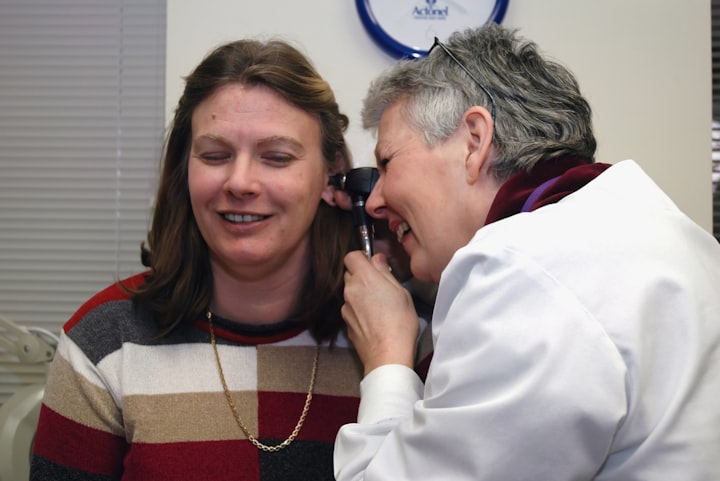
Tinnitus is the perception of sound in the absence of an external sound source. It is commonly referred to as "ringing in the ears," but it can also be experienced as buzzing, humming, hissing, or other sounds. Tinnitus is a common problem that affects approximately 10-15% of the population and can be caused by a variety of factors, including:
- Exposure to loud noise
- Age-related hearing loss
- Ear infections or wax buildup
- Head or neck injuries
- Medications, such as some antibiotics, anti-inflammatory drugs, and cancer medications
- Cardiovascular disorders
- Stress and anxiety
Tinnitus can be temporary or chronic, and the severity of symptoms can vary from person to person. While there is no cure for tinnitus, there are treatments that can help manage symptoms, including sound therapy, cognitive-behavioral therapy, and medications to manage underlying conditions. It is important to consult with a healthcare professional if you are experiencing tinnitus to determine the underlying cause and appropriate treatment.
Tinnitus is a complex condition that can have multiple causes. Some of the most common causes of tinnitus include:
- Noise-induced hearing loss: Prolonged exposure to loud noise can damage the hair cells in the inner ear, leading to tinnitus.
- Age-related hearing loss: As we age, the hair cells in the inner ear can naturally deteriorate, leading to hearing loss and tinnitus.
- Ear infections: Middle ear infections can cause inflammation and swelling that can lead to tinnitus.
- Earwax buildup: Excessive earwax can block the ear canal and cause tinnitus.
- Ototoxic medications: Some medications can damage the inner ear and cause tinnitus, such as certain antibiotics, diuretics, and cancer medications.
- Cardiovascular disease: Tinnitus can be a symptom of cardiovascular disease, such as high blood pressure or anemia.
- Neurological disorders: Tinnitus can be a symptom of certain neurological disorders such as Meniere's disease and acoustic neuroma.
- Psychological factors: Stress, anxiety and depression can lead to tinnitus.
It's important to note that in some cases, the cause of tinnitus may not be known. This is known as idiopathic tinnitus.
It's essential to consult with a healthcare professional to determine the cause of tinnitus and the best treatment plan. A comprehensive examination and diagnostic tests may be needed to identify the underlying cause of tinnitus.
Tinnitus can be 'cured' as long as you understand the mechanism and act to reverse the Jastreboff cycle so that you no longer hear the noise. Once you understand the process you'll know how to reverse it.
I had tinnitus a few years back and I used the three main techniques to resolve tinnitus. I didn't find the rTMS helpful, but it seems to have good research behind it. I found 180 phase sounds useful when the tinnitus was very loud. But the standard TRT (Tinnitus Retraining Therapy) works once you put the effort in. It took me 3 months to clear my tinnitus but I guess I knew what I was doing.
When I see patients now most of them reduce their tinnitus to a manageable level (to the point where it doesn't bother them and they don't notice it often) within about 6 months. They can go on to make things silent in their own time. I went on just to prove it can be done.
There are a number of diseases which cause tinnitus that isn't solved with this technique (glomus tumours etc.) But they are solved in different ways. Having hearing loss also causes a lot of problems as you need to be able to use your ears for this to work.
The thing I hate most is when people say you can't cure tinnitus and you have to live with it. This is a simple processing error in most people. Please go to your local ENT Consultant and get it fixed.
The simple short explanation is this:
Put anyone into a sound proof room and most people, if left long enough (a minute or so), will start hearing tinnitus. Tinnitus is a sound that you have always heard in your ears for the whole of your life. A bit like hearing a pulse in your ears, you might hear it when you are scared or running, but it goes because you know why you are hearing it. You cannot 'cure' yourself of a pulse, but you can stop hearing it. A lot of people in a sound proof room hear a high pitch whistling / ringing noise or a number of other similar sounds. These are similar to the sounds that tinnitus sufferers hear. These sounds we are always able to hear, but are filtered out of our hearing consciousness. There is no need to hear our pulse every day of our lives, it doesn't help us to constantly be aware of this and other sounds.
The brain does this all the time. For example when I got married it took me a day or so to completely forget I was wearing a ring. The brain filtered this information out so we can concentrate on important sensations. The same thing happens daily when we put on our shirts or shoes, after a minute or so we forget the sensation that we are wearing them. The same process occurs with additional sounds that aren't of any real importance. We stop listening to them so we can concentrate on hearing speech or music etc. The brain actively filters out sounds that it has learnt we don't want / need to hear. After a while on an airplane you don't hear the background noise as much etc.
Sometimes in our lives we can get a flu or ear infection that reduces our hearing for a week or so. Or perhaps you might go to a loud concert and you might have low hearing for 24 hours as a result. Sometimes it is just being in a quiet location which sets off tinnitus. The brain when faced with reduced sensations to process from the ears. It gets confused with this, and starts worrying. The brain isn't particularly clever in this regard, it has no idea you have been to a concert or you have an ear infection, it just knows that fewer electrical signals are coming from an ear. In response it decides in most people to drop a filter or two to see what that will do. It starts allowing you to hear the irritating noises that it has blocked off for so many years just because there is nothing else to do.
The crucial thing now is your reaction to this noise. People often worry when they hear these noises and start thinking the worst. “Oh dear I think that concert has ruined my ears” or “wow, do I have a brain tumour?” The brain senses your worry, interprets this as an important noise for the first time and therefore worries itself that it should have been paying more attention to it all these years. It therefore starts the process of focusing in on this noise that it has been wrongly ignoring for all these years. It wrongly interprets your fear as something that you want to hear more of.
Initially it often doesn't bother people too much as you only hear it when it is quiet (like when you are trying to sleep at night), but if this happens night after night the brain's fear is re-enforced and it slowly alters the pathways in the brain so that it can hear it more clearly. The noise therefore gets louder and louder, until it annoys you all day.
People with depression and anxiety are particularly bad at dealing with tinnitus as they have a clinical inability to cope with events. So they slip into tinnitus suffering quicker than most.
The point is that if you understand this process, you can understand how to reverse it again. A lot of doctors tell their patients to listen to the radio to mask out the noise, but they neglect to explain why they should do this. The idea of masking is to re-establish the filter that was dropped in the first place and reverse the Jastreboff cycle I described above. The idea is to never hear your own tinnitus. Never be in a situation where you are aware of tinnitus. If you hear your tinnitus quickly do something that will distract you mind away from it. In the early stages most people don't notice it during the day when they are busy, or chatting with their friends. So you need to recreate that effect whenever you hear your tinnitus. For example if you are a teenage boy, I would suggest buying a playstation 4 and playing a fast paced game whenever you hear your tinnitus (this has certain social consequences, but they love it). Most boys will switch off from the world with a PS4 controller in their hand, and I haven't met one that can hear his tinnitus during a game of FIFA or Battlefield 1. I am getting old and boring so I listened to radio 4 (which is a radio station in the UK which has news, events, shows, no music), to help me with my late night tinnitus. Eventually when the shipping news was on I was so bored I fell asleep. Podcasts or watching the TV in bed until you drop off is good too. Anything that will distract your mind away from the noise. I'm not a fan of white noise as it tends to annoy people just as much as the tinnitus, which is the last thing you want. Tinnitus gets worse when you are stressed, tired, hungry etc.
The more diligently you do this and the more determined and motivated you are to avoid ever hearing you tinnitus by constant distraction, the quicker you'll get better.
Some people then say to me, well I have lost a lot of my hearing, so this will be difficult to do. This is a tough situation as hearing noises and therefore giving the brain something to listen to is really important here. But that's why getting good hearing aids are important (assuming you can't fix the hearing with surgery). Hearing aids would improve your hearing to the point that you can hear that Aircon machine at work, or the kids playing in the park outside, or the twittering of neighbors in a block of flats etc. It provides much needed stimulation to your brain, which will put you on the path to not hearing your tinnitus.
Okay I have left out a lot, but that is the bare bones of it. That will treat the standard tinnitus sufferer that doesn't have a brain tumour, menieres disease, or whatever. The 99% of people out there.
If you understood that rambling message above you'll know now why I hate it when people say tinnitus is a disease you can't do anything about and you have to live with it. Firstly that's not really true, and secondly it puts fear into people and makes tinnitus worse and causes suffering to so many people.
There are people who say they have tried everything and now it is screaming in their ears. This is the other half of Tinnitus Retraining Therapy which I think is for the extreme sufferers. Once they have learnt to be able to cope with the situation they can then get on and reverse the process.





Comments
Fairul Nizam is not accepting comments at the moment
Want to show your support? Send them a one-off tip.